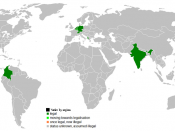Euthanasia is legally, morally and ethically unacceptable. Discuss.
The word Euthanasia is derived from the Greek words eu (Well) and thanatos (Death), and according to Johnstone (1994) was used to describe the spiritual state of an individual who is close to death. The word has become corrupted over time, and now is taken to mean the deliberate ending of a life in order to relieve pain and suffering. The concept of euthanasia, as we now it today, can be traced back to circa 400 BC, where ancient medical circles regarded it a major crime, with, according to Johnstone, Plato suggesting that any physician who attempted such an action should be punished by death.
In more recent times involuntary euthanasia was used in Nazi Germany between 1935 and 1945 to remove the "undesirable" elements from society, such as the disabled and elderly and mentally infirm, in a form of "economic euthanasia".
This eventually paved the way to the extermination of Jews and Gypsies in Europe during the early part of the 20th century, and as a result is associated with the holocaust and is a somewhat taboo subject. Euthanasia is classified into two distinct types, that of passive euthanasia, in which it is argued, the action does not involve any intentional harm, and death results from either the non-treatment or the "good willed" attempts at symptom control. Active euthanasia on the other hand involves a direct intervention to shorten the life of the patient, and the death of the patient was the intention. Also there exists the distinction between voluntary euthanasia, which is at the patients request, and involuntary euthanasia, in which the patient makes no specific request for euthanasia, and the judgement of others is used. The debate surrounding euthanasia evokes many impassioned feelings, and has opened up thoughtful questions...



Informative
well written
0 out of 1 people found this comment useful.